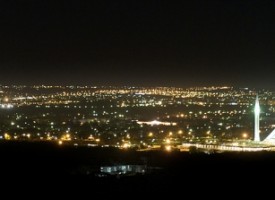The energy crisis has devastated Pakistan–a country so young and powerful, a country that has been able to stand tall, proud and resistant to come what may, ever since it was born in 1947. Pakistan is the country that did not let herself fall down to the greater problems she faced after The Partition. It survived. It survived well due to the honest leaders and committed determination of its population. Unfortunately, honesty toward the state comes last in our leaders today, and because of that, the moral and determination of the population has gone down the drain. The energy crisis is sucking the life out of Pakistan. The impact of the energy crisis on the lives of common people in Pakistan is remorseful.
Pakistan’s progress has come to a halt due to the energy crisis. The production industry of Pakistan is suffering from constant shutdowns. Due to the lack of electricity, the production mills of different industries, such as textile, food, steel, wood, pharmaceutical, water, etc., has gone down.
For the first time, production is being halted not due to the lack of time but due to the lack of energy resources. Not only has this caused profits and investments to go down but that, in turn, has also led to a high rate of redundancy and, eventually, unemployment. The blue collar workers that account for nearly 70 percent of employees working in these production houses lose jobs every single day. They cannot find work anywhere else because they do not have the required education. Since they are jobless, they are unable to pay for ever-increasing bills. They lose hope and their lives just stop. Media has reported an increase of 20 percent in the rate of suicide in the last three years than compared to the last eight years.
Furthermore, the government’s incompetence and apathy to deal with the problem are the main causes for the energy crisis in the country. The government’s failure to form long-term energy policies, the attitude of delaying projects, and most important, the lack of will to resolve the crisis has remained a pivotal factor of the energy crisis. The crisis has reached an alarming stage due to the fact that country’s administration has remained unsuccessful in exploiting alternative energy sources, such as nuclear, coal, tidal and solar energy. There’s also the demand–the supply gap of energy has dramatically widened over the last few years. In addition, some key factors, such as energy theft, rapid population growth, increase in demand by industries and the agriculture sector, have immensely contributed to the crisis as well.
As a result, the energy crisis has affected people from all spheres of life. For instance, the short falls in gas and electricity has resulted in the closure of many industries, whereas the many areas depending solely on electricity for their irrigation have been badly affected by the crisis. The trade deficit has unfortunately risen due to larger imports compared with country’s exports. In addition, the services sector as well as the households sector have not been able to escape from the situation, either.
The lack of Sui gas in the rural areas has forced people to create and look for their own energy resources. This has pulled them back into the stone ages, except for the fact that they still have to pay the same amount of bills, even when they are not getting the services. The lack of gas and electricity has created an uproar in the country. Every day people are forced to come out in the streets and engage in protests against the government. People know there are solutions to the energy crisis in Pakistan; for example, a recent study has revealed that the Thar Coal Power Plant has the ability to produce 50,000 megawatts of electricity–and that can last for 300 years. The protests are increasing day by day with these revelations, and so the people are now being arrested leading to social unrest.
Keeping this in view, the government must launch its short- and long-term implementable policies in order to assure an uninterrupted supply of energy in the country. In the first step, the government should establish a separate body or board that should only deal in resolving the energy issues. In the second place, all the possible alternatives–either renewable (especially, solar and wind) or nonrenewable (particularly, coal, oil and gas) sources–must be exploited. Pakistan has been facing political instability since forver. But the instability has increased in the last couple of years because promises to eradicate the energy crisis were never fulfilled by our leaders. This constant accumulation of frustration and hopelessness has seeped into the personalities of our younger generation in Pakistan. The tolerance level has decreased, and people are suffering from emotional instability. It would not be wrong to conclude that the energy crisis has affected the lives of common people in a devastating way–the healing of which will take decades.








Nuclear energy has proven to be very dangerous.
Coal & Tidal to be polluting
Solar energy is the less costly, the cleanest & widely available here in the country.
Search for sustainable sources like recycling to get primary resources of energy & avoid more pollution of the country.
Educate people on how to protect the environment.
Any one who can solve Three problems in Pakistan can be a national hero.
1. Education: All 5 years old must go to school till they are 15 years old.
2. Electricity and Gas: Provide the energy as an URGENT NEED.
3. Security : Eliminate the terrorists including the economic terrorists, The land grabbers and Bhatta Khors.
I m agree with that because i read every thing that written in this website. Actually the problem is in our country is not leader actual problem is we are. we should see in our necks and then ask the leader. we chose our leaders before seeing them that,s our real problem.We are responsible for the loss of country becuse we chose the leader
and our chosen leadera are not good we our death simply. And we ask the media and leader for the loss.
That,s all!!!!!!